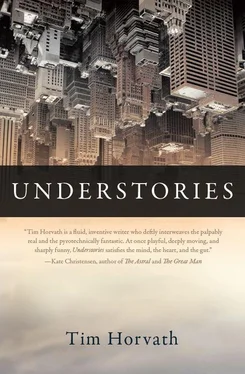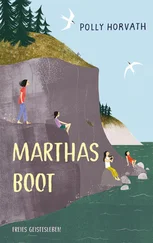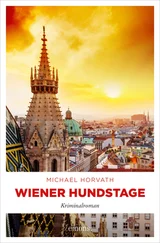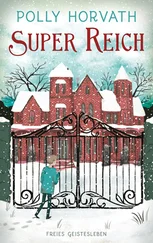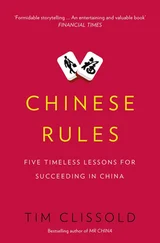“What do you think?” says Angus, tapping Pete on the shoulder. “Can we say ‘Best Concept Yet’? Can we say ‘What time do the banks reopen?’”
Pete’s catching more people he recognizes now. Martin Feldspar from Baldis Tool Rental. He greets a mother he remembers from playgroup. He’s looking around for others. Maybe Mrs. Dobbins will be here. He’s got one arm on each of the kids, leans down. “If we get separated,” he says, “let’s meet right next to the snail slide.” Then he turns to Angus. “I don’t think people want to endlessly relive their vacations,” he says. “I think they want to go on new vacations. They want to get back to work and make enough money so they can have a single vacation, just once, with someone they care about. And then they can relive that, sure. In their minds .”
Angus looks a bit stymied for a second, like a boxer whose chin just got grazed. “Kids, what do you think?” he says, dropping into an eye-to-ear squat with Sasha. It’s the closest he’s ever seen Angus get to her, reminiscent of when Pete destingered Esther on Halloween. But Pete had been comforting, hadn’t he? Angus looks slightly scary. Hunkered into this awkward crouch with his fiery sideburns, he looks like some clown that the place has hired for the day to keep the kids entertained, but who will cause about 5 % of them to wet themselves. “Do you like it when vacation is over? Or do you want to go back, keep your vacation going?”
“Keep it going,” says Sasha. Hanh shrugs. If this is his vacation, he wants it over ASAP.
“This is amazing,” Angus says, regaining his feet. “We’ve got it all set up. A ready-made test audience, here. People of all shapes and sizes. Kind of white and middle-class, but let’s face it, who will be availing themselves of this service anyway, right? What did you say the name of this place was again?”
“Runaroundandscreamalot!” says Sasha.
“Yeah,” says Angus, that glaze in his eye, one Pete can remember seeing, but not for a lot of years. It was when he was going to do something bold and fiendish, like in Rooftop Apocalypse, right before he doused Pete’s shoes with gasoline and set the match alight. He starts to wander away, and Pete watches him break into a jog, weaving between the clumps of people. He’s headed for the crawlbyrinth — but no, he’s stopping at the castle, sizing it up. He misses the moment when Angus is in midair, but next thing you know, his brother is hanging off the side by one arm like some kid. At first this is amusing, and Pete taps Sasha. “Look at Uncle Angus. What is he do ing?”
Sasha starts laughing, and others are beginning to take notice.
“Attention, attention!” Angus is shouting. “People of Runaroundandscreamalot!”
“Wait here,” says Pete to Sasha and Hanh. “I’ll be right back. Wait together?” They nod solemnly.
“Patrons, regular and under today’s inclement conditions, of Run-around-and-s- cream -alot!”
Jesus , thinks Pete, in a headlong race toward the castle now, the crowd parting for him. Everything has begun to happen in slow motion. He sees Tru Renfro coming from behind the counter, sees her bafflement at this latest disturbance, somehow sees in her eyes in that single instant that she feels that she’s opened up her establishment to the public under these extreme circumstances, that this storm could be the thing that keeps her in business, keeps her alive, keeps her from the fate of an adult-video store and of the storefronts on Main Street, stores that had been there for fifty years, stores that still sold penny candy, stores that had opened with the bluster of youth in benigner times, selling fashionable things when fashionable things seemed like necessities, seemed important, when everything that didn’t seem to matter anymore nowadays had, but all that matters, as Pete can now see on Tru’s face, is that she keep them all warm today, and that’s what matters to Pete, too — that he keep them warm. And here’s this lunatic, flying from the battlements, cupping his hands and yelling “Runaroundandscreamalot!” The people are restless and cold and confused, plus there are too many of them, and on an ordinary day it would be a fire hazard, a dozen codes violated, and people get trampled under conditions like these, do they not, the smaller ones can die, and there are a lot of small ones here. Next thing he knows, Pete himself is leaping onto the castle, tackling his brother, grabbing at him like he grabbed that stinger, with that same urgency, knowing that he has to silence him just this once, has to seize the upper hand. Down they tumble into the guts of the castle, the inner sanctum where he’s watched Sasha play plenty of times but never had occasion to go. They clutch at each other, grunting, and he feels the spittle fly hot at him from Angus’s mouth as his brother curses, sees the bulge of his flaring eyes, their wild longing, and he pulls Angus at last into the embrace he’s always wanted to throw around him but never has.
Urban Planning:Case Study Number Six
The city that was in denial that it was a city had a weekly farmers’ market that ran through late fall. It drew farmers from miles away. They had to drag their wares on the subway or through gridlock. The central plaza went from its pigeonmolt weekday self to a Saturday-morning bounty of fruit so bright and burnished it seemed to exhaust the light around it. They talked of the harvest, traded tips about fire blight, and muttered obscene things about those who took free samples with no intention to buy. One man made puppets of his potatoes and was at once a big hit. At the end of the day, they all packed up except the pigeons, who strutted and churred amid the fallen toothpicks and cheeses and relish.

The city that was in denial that it was a city called the skyscrapers “mountains,” its giant central train station “the Butte,” its industrial waterfront “the marshlands,” its spindly bridges “land bridges,” its vacant lots “the ocotillo patches,” its sewers “the arroyos,” its sidewalks “eskers,” its elevated trains “cutbanks,” its skyline “the tree line,” its brownstones “brown stones,” its city hall “the Glacial Erratic,” and its mayor “the Fungus Gatherer from Between the Hills.” Commuters, craning their necks in search of any sign that their train’s lights were coming closer, sighed and reminded themselves that they were, after all, dealing with a terminal moraine. They glanced occasionally at their watches, which they stopped short of calling “the sun.”

The city that was in denial that it was a city went to a support group for other cities with similar problems. Only they weren’t the same problems at all. One city was dealing with overcrowding, another with a crime wave, bodies bloating harborside. Another was shutting down factories like crazy, its ’stacks no longer spewing. The city that was in denial listened patiently to the other problems, eloquently delivered, but when it was its turn, it stood up. “Look,” it said soberly, “there’s been some mistake. I simply don’t belong here. Y’all are great. . fabulous. You”—it pointed to the nonspewer in particular—“haven’t danced your last two-step. Any of you — we could grab a drink, catch a late flick. But at the end of the day, we must part ways, we going back to our endless starry sky, and you. . well, we are glad to send you a postcard of our starry sky.” The starry sky was the two, three, and four o’clock shows at the planetarium, which they’d dubbed “Old Hoag’s Field.”
Читать дальше
